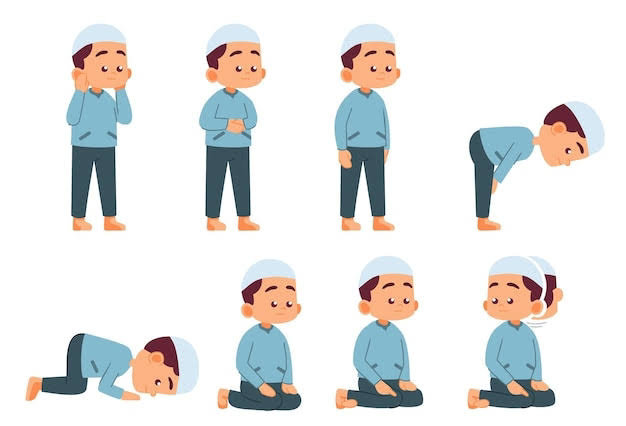How Islam teaches us to take care of our health
Islam emphasizes the importance of taking care of one's health. It encourages Muslims to maintain a balanced and moderate lifestyle, as the body is considered a gift from Allah. That's why we should respect our body and take care of our health till the last breath. Islam teaches us some ways to take care of our health.
Dietary Guidelines
Muslims are encouraged to consume Halal (permissible) and Tayyab (wholesome) foods. Overeating and extravagance are discouraged. Fasting in the month of Ramadan also has health benefits. if fasting is done correctly.
Cleanliness
Islam attaches great importance to both personal cleanliness and cleanliness in the surrounding environment. Wudu is mandatory before prayer.
Cleanliness has an important place in Islam. Many acts of worship in Islam necessitate that one is physically and ritually pure. For example, one cannot perform Salaah or touch the Quran if one has not performed Wudhuu.
Physical activity:-
Islam promotes physical fitness through acts of worship, such as regular prayer (namaz) that involve physical activity.
Engaging in permitted sports and activities is also encouraged.
It should be kept in mind that the Prophet and his companions were naturally and physically healthy.
Life at that time was difficult, long distances were covered on foot, people hunted and farmed for food to survive, and entertainment such as television did not exist, which encouraged laziness and wastage of time .
At that time it was almost taken for granted that believers (Muslims) would be physically fit. It was not until later generations that the learned were suffering from obesity and laziness. May Allah protect us like him.
Aameen summa aameen
"Boxing is not allowed in Islam because a Muslim should not punch people in the face. Islam encourages exercise and sports, but Muslims must be careful that their exercise does not lead them to something that is unacceptable".
Mental Health:-
Islam encourages seeking knowledge, introspection and self-improvement. In Islam, Muslims are taught to pray and to be patient in difficult times.
"Allah says in Quran
And We will surely test you with something of fear and hunger and a loss of wealth and lives and fruits, but give good tidings to the patient,
(SURAH AL-BAQARAH AYAT 2:155)"
Sleep and rest
Islam says to take proper rest and sleep for our health. islam teaches us get 6-7 hours of sleep per night, it is enough for our health
"Narrated `Abdullah bin Amr
"Allah's Messenger ﷺ said, "O Abdullah! Have I not been formed that you fast all the day and stand in prayer all night?"
I said, "Yes,
ﷺ said, "Do not do that! Observe the fast sometimes and also leave them (the fast) at other times; stand up for the prayer at night and also sleep at night. Your body has a right over you, your eyes have a right over you and your wife has a right over you."
Abstaining from harmful substances:-
Islam has strict prohibitions on alcohol and drugs, promoting a healthy lifestyle and preventing addiction. alcohol is haram in islam.
"Allah says in Quran
"They ask you (0 Muhammad) concerning alcoholic drink and gambling. Say: In them is a great sin, and (some) benefits for men, but the sin of them is greater than their benefit""
(SURAH AL-BAQARAH AYAT 2:219)
Caring for the sick:-
Muslims are encouraged in Islam to visit and care for the sick, to show kindness and help to those in need.
The Prophet Mohammad ﷺ said: "If a person becomes ill, Allah rewards him for his illnesses."
-Sahih Bukhari, 550,
Sahih Muslim, 6235
Narrated 'Abu Hurairah (ra):
The Messenger of Allah ﷺ said, "Every Muslim has five rights over another Muslim (i.e., he has to perform five duties for another Muslim): to return the greetings, to visit the sick, to accompany funeral processions, to accept an invitation, to respond to the sneezer [i.e., to say: 'Yarhamuk-Allah (may Allah bestow His Mercy on you),' when the sneezer praises Allah]"
Riyad as-Salihin, The Book of Visiting the Sick Book 7, Hadith 895 [Al-Bukhari and Muslim]
Balancing work and rest:-
Islam encourages a balanced approach to work and rest, promoting a healthy work-life balance.
Work-life balance is essential to a Muslim’s life. Islam emphasizes balancing work and personal life, caring for physical and mental health, prioritizing family and social relationships, and engaging in charitable work. By following these principles, Muslims can lead a fulfilling and balanced life, which is pleasing to Allah and beneficial for themselves and their community.
Environmental responsibility:-
Islam teaches stewardship of the earth and encourages protection of the environment, which has a direct impact on human health.
Humans who mismanage natural resources, including excessive environmental exploitation, resulting in industrial pollution, damage to ecosystems, and mismanagement of natural resources, are detestable to God Almighty, as the verses of the Qur'an make clear . To appear:
"And they quarrel and create mischief in the whole earth, and Allah does not like mischief-makers.
(Quran. 5: 64)
By following these principles, Muslims can maintain good physical, mental and spiritual health, which is essential to living a fulfilling life. Always consult health care professionals for personal advice on health matters.
Taking care of your health is considered important in Islam. It is encouraged to maintain a balanced lifestyle that includes a healthy diet, regular exercise, and good hygiene practices. Additionally, it is highly recommended to seek medical treatment when required, as the protection of health is seen as a valuable gift from Allah. Adherence to the teachings of Islam, which includes moderation in all aspects of life, can contribute to well-being and physical health.












